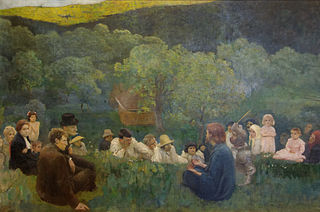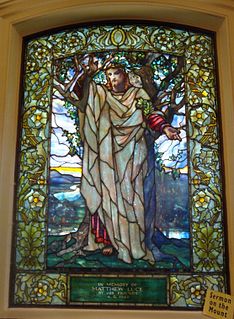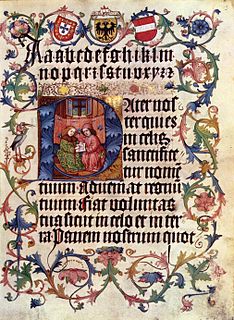This article needs additional citations for verification .(May 2015) (Learn how and when to remove this template message) |

The Birds of Heaven[ citation needed ] (also referred to as The Flowers of the Field or The Lilies of the Field) is a discourse given by Jesus during his Sermon on the Mount as recorded in the Gospel of Matthew and the Sermon on the Plain in the Gospel of Luke in the New Testament. The discourse makes several references to the natural world: ravens (in Luke), lilies and moths are all mentioned.
Contents
From Matthew 6:25–33 (King James Version "KJV"):
6:25 Therefore I say unto you, Take no thought for your life, what ye shall eat, or what ye shall drink; nor yet for your body, what ye shall put on. Is not the life more than meat, and the body than raiment?
6:26 Behold the fowls of the air: for they sow not, neither do they reap, nor gather into barns; yet your heavenly Father feedeth them. Are ye not much better than they?
6:27 Which of you by taking thought can add one cubit unto his stature?
6:28 And why take ye thought for raiment? Consider the lilies of the field, how they grow; they toil not, neither do they spin:
6:29 And yet I say unto you, That even Solomon in all his glory was not arrayed like one of these.
6:30 Wherefore, if God so clothe the grass of the field, which to day is, and to morrow is cast into the oven, shall he not much more clothe you, O ye of little faith?
6:31 Therefore take no thought, saying, What shall we eat? or, What shall we drink? or, Wherewithal shall we be clothed?
6:32 (For after all these things do the Gentiles seek:) for your heavenly Father knoweth that ye have need of all these things.
6:33 But seek ye first the kingdom of God, and his righteousness;and all these things shall be added unto you.

From Luke 12:22–32 (KJV):
12:22 And he said unto his disciples, Therefore I say unto you, Take no thought for your life, what ye shall eat; neither for the body, what ye shall put on.
12:23 The life is more than meat, and the body is more than raiment.
12:24 Consider the ravens: for they neither sow nor reap; which neither have storehouse nor barn; and God feedeth them: how much more are ye better than the fowls?
12:25 And which of you with taking thought can add to his stature one cubit?
12:26 If ye then be not able to do that thing which is least, why take ye thought for the rest?
12:27 Consider the lilies how they grow: they toil not, they spin not; and yet I say unto you, that Solomon in all his glory was not arrayed like one of these.
12:28 If then God so clothe the grass, which is to day in the field, and to morrow is cast into the oven; how much more will he clothe you, O ye of little faith?
12:29 And seek not ye what ye shall eat, or what ye shall drink, neither be ye of doubtful mind.
12:30 For all these things do the nations of the world seek after: and your Father knoweth that ye have need of these things.
12:31 But rather seek ye the kingdom of God; and all these things shall be added unto you.
12:32 Fear not, little flock; for it is your Father's good pleasureto give you the kingdom.
The New King James Version incorporates Luke 12:33–34 within the same section:
Sell what you have and give alms; provide yourselves money bags which do not grow old, a treasure in the heavens that does not fail, where no thief approaches nor moth destroys. For where your treasure is, there your heart will be also.













